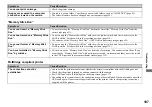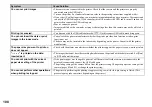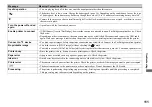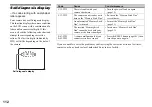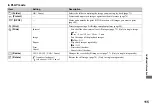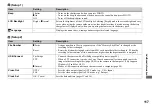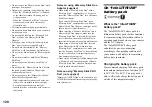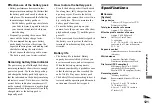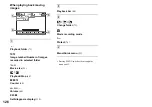
118
Precautions
Do not leave the camera in the
following places
• In extremely hot place, such as in a car
parked in the sun. The camera body may
become deformed or this may cause a
malfunction.
• Under direct sunlight or near a heater.
The camera body may become discolored
or deformed, or this may cause a
malfunction.
• On rocking vibration
• Near strong magnetic place
• In sandy or dusty places, be careful not to
let sand or dust get into the camera. This
may cause the camera to malfunction, and
in some cases this malfunction cannot be
repaired.
On carrying
Do not sit down in a chair or other place
with the camera in the back pocket of your
trousers or skirt, as this may cause
malfunction or damage the camera.
On cleaning
Cleaning the LCD screen
Wipe the screen surface with an LCD
cleaning kit (not supplied) to remove
fingerprints, dust, etc.
Cleaning the lens
Wipe the lens with a soft cloth to remove
fingerprints, dust, etc.
Cleaning the DC plug
Clean the DC plug of the AC Adaptor with
a dry cotton bud. Do not use the dirty plug.
Use of the dirty plug may not properly
charge the battery pack.
Cleaning the camera surface
Clean the camera surface with a soft cloth
slightly moistened with water, then wipe
the surface with a dry cloth. Do not use the
following as this may damage the finish or
the casing.
– Chemical products such as thinner,
benzine, alcohol, disposable cloth, insect
repellent or insecticide, etc.
– Touch the camera with the above on your
hand
– Contact with rubber or vinyl for a long
time
On operating temperature
Your camera is designed for use between
the temperatures of 0°C and 40°C (32
°
F and
104
°
F). Shooting in extremely cold or hot
places that exceed this range is not
recommended.
On moisture condensation
If the camera is brought directly from a cold
to a warm location, or is placed in a very
damp room, moisture may condense inside
or outside the camera. This moisture
condensation may cause a malfunction of
the camera.
Moisture condensation occurs easily
when:
• The camera is brought from a cold
location such as a ski slope into a warmly
heated room
• The camera is taken from an air-
conditioned room or car interior to the hot
outdoors, etc.
How to prevent moisture
condensation
When bringing the camera from a cold
place to a warm place, seal the camera in a
plastic bag and allow it to adapt to
conditions at the new location over a period
of time (about an hour).
If moisture condensation occurs
Turn off the camera and wait about an hour
for the moisture to evaporate. Note that if
you attempt to shoot with moisture
remaining inside the lens, you will be
unable to record clear images.




